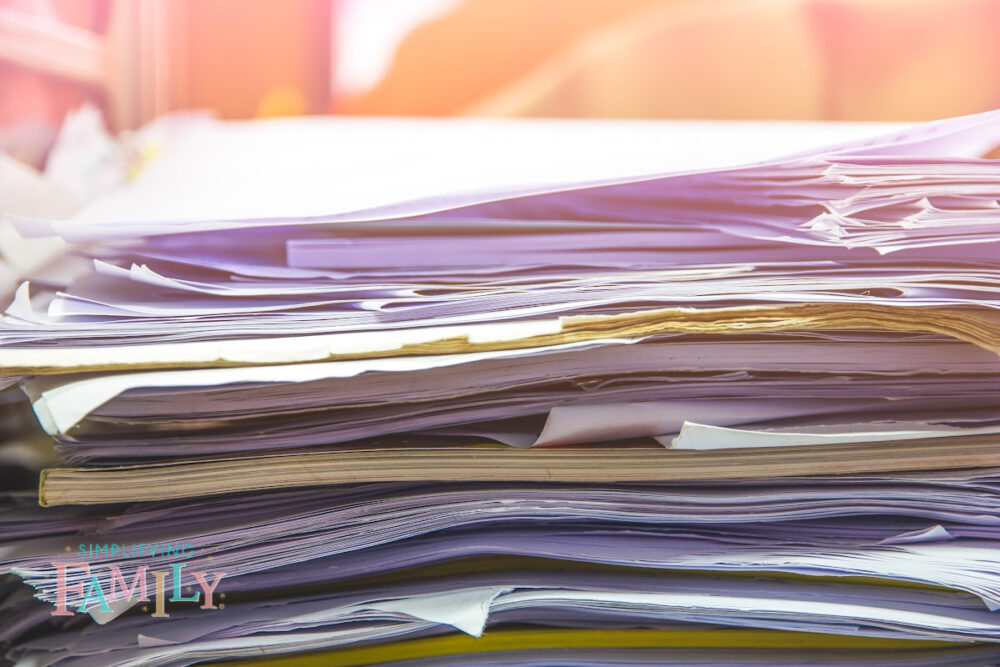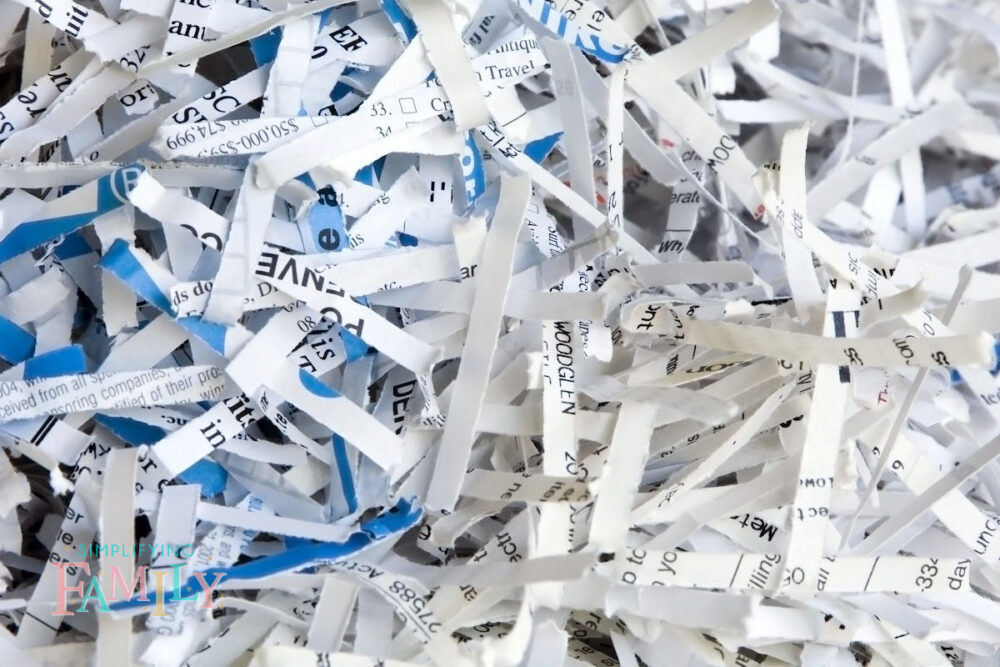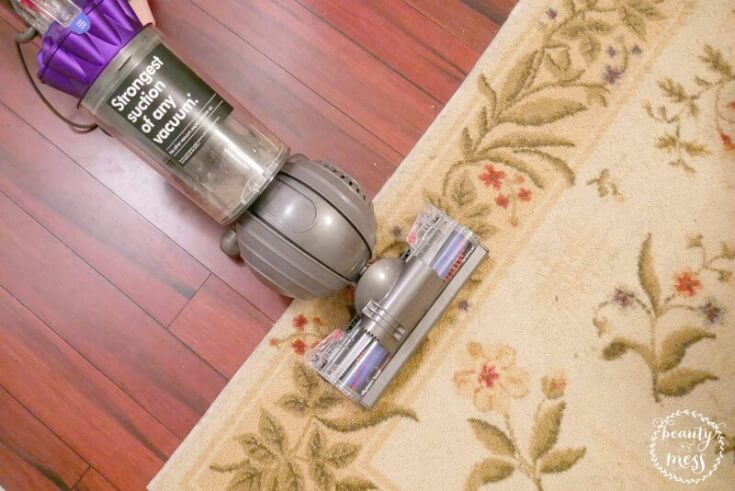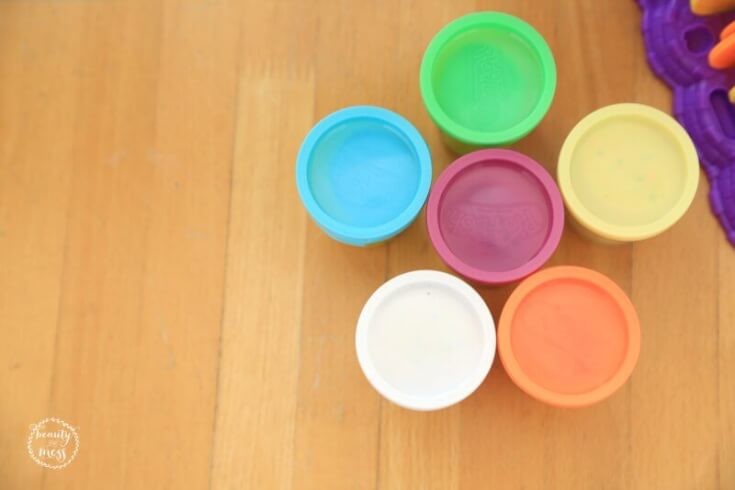Declutter Your Documents: Simple Steps to Organize Your Paper
Have you ever looked at the piles of paper and closed the door, or shuffled them around to deal with them later because the mere thought of taking the time to declutter your documents feels too overwhelming? If so, then these tips for organizing your piles of paper are perfect for your next decluttering project.
Before becoming a parent, I imagined life with a crystal-clear routine, where organization reigned supreme, especially regarding financial documents and management. The reality? I found myself amid paper chaos, struggling to discern what papers I needed to keep. What paperwork should I keep and for how long? The questions felt endless, as did the piles of unsorted documents covering every home office surface.
In this pursuit of simplifying life and decluttering both mind and space, I embarked on a journey to find the perfect balance – deciphering the maze of financial paperwork. In this article, we’ll dive deep into the clutter, guiding you through quick tips for deciding when to keep or toss and sharing strategies on how to organize important documents at home and how to store paper documents long-term. Because, in the end, isn’t it all about simplifying our lives and making mornings less stress-filled?

Key Takeaways:
- Identify Essential Documents: Learn what financial documents are crucial to keep and for how long.
- Decluttering Strategies: Discover an easy system for deciding which papers to toss and which to save.
- Organize Efficiently: Gain insights on organizing and storing essential documents for easy access and peace of mind.
Declutter Your Documents: What to Keep?
Diving into the clutter of paperwork on my kitchen counter, I often find myself pondering, “What papers do you need to keep? And for how long?” Navigating through the ocean of documents, I’ve come to realize the paramount importance of holding onto certain pieces of paper that seem like mere formalities but are, in essence, pillars of our financial and legal identity.
Take, for instance, tax records, W-2, and 1099 forms; these are not just paperwork but keystones ensuring we comply with the laws and are ready for any financial reviews that might come our way. It’s surprising how these documents, which might seem redundant today, can be life savers when you’re confronted with an unexpected audit or legal scrutiny.
The thought of discarding receipts for significant purchases also sends shivers down my spine. This is where we tread a fine line between decluttering and safeguarding our future. These receipts are not just proof of purchase but might come in handy for warranty claims, insurance, or even for substantiating claims of ownership in legal disputes.
Discarding them prematurely might seem like a step towards minimalism, but could we be unwittingly setting ourselves up for potential headaches? It’s a quandary, truly, pondering “What paperwork should I keep, and for how long?” I’ve come to cherish these documents, not for the paper they’re printed on, but for the peace of mind they offer. It’s a gentle reminder that sometimes, being a hoarder of the right documents isn’t such a bad strategy after all.
But, is it the best way to deal with paper clutter?
Tax Records: A Closer Look
I’ve always followed a golden rule: keep everything for at least seven years. You’re probably wondering, “What paperwork should I keep and for how long?”, especially regarding the IRS. Well, the IRS statute of limitations for auditing is three years. However, situations occur where they can extend this period to six or even seven years, particularly if income was underreported by 25% or more. It’s a bit nerve-wracking, isn’t it?

Considering all this, consulting a tax professional when dealing with tax returns feels like a no-brainer to me. They offer that peace of mind by providing state-specific advice, ensuring you’re not caught off guard. It’s one of those quick tips for deciding when to keep or toss I’ve come to rely on. After all, organizing important documents at home isn’t just about decluttering, it’s about protecting ourselves too.
When it comes to how to store paper documents long-term, knowing you’ve got your tax records in order just sets the right tone for everything else. So, here’s to embracing the joy of decluttering, with a well-organized file system as our foundation.
Short-Term Keepers
Staring at the stacks of papers sprawled across my dining table, a mix of bank statements, bills, and random receipts, I find myself debating the fate of each piece. It’s an all-too-familiar scenario in my journey to declutter. In my hand, I hold a pile of what I call Short-Term Keepers – those documents that don’t warrant long-term storage but seem too important for the shred pile…yet. Among these are non-tax-related bank and credit card statements, closely followed by the monthly utility bills that seem to multiply when my back is turned. I’ve learned, sometimes the hard way, the value of the ‘better safe than sorry’ mantra – a philosophy that guides my somewhat indecisive hand.
For anyone standing in similar shoes, hesitating over the recycle bin, I share this wisdom: holding onto these documents for less than a year offers a safety net while you determine their true value in your financial narrative. It’s a practical compromise between hoarding every scrap of paper and prematurely purging what could be a key piece of a larger financial puzzle.
The Forever File: Documents to Keep Indefinitely
Imagine, while decluttering your documents, stumbling upon The Forever File: a treasure trove of paperwork that should never see the inside of a shredder. It’s here, in this sacred space, that we safeguard the keystones of our financial and personal lives.
What papers do you need to keep?
Think of personal identification – those cornerstones of our identity. Passports, birth certificates, social security cards – they are the bedrock on which our administrative lives are built. Nestled alongside these priceless papers, find insurance policies, the guardians of our peace of mind, whispering assurances that we’re covered, come what may. And let’s not forget about titles and deeds, the concrete proof of our dominion over our possessions. These documents anchor us, providing irrefutable evidence of our past decisions, our present circumstances, and our paths forward.
How to store paper documents long-term becomes a paramount question, urging us to secure these irreplaceable lifelines in waterproof, fireproof sanctuaries, ensuring their survival against the unforeseen. This Forever File is not just a collection of papers; it’s a chronicle of our lives, a testament to our existence, and a legacy to be carefully curated and zealously protected.
Quick Tips for Deciding When to Keep or Toss
The overwhelming piles might feel like a constant battle against your sanity and your home’s orderliness. But, fear not, because I’ve compiled quick tips for deciding when to keep or toss that will enlighten your path.
If you’re staring at documents, debating their fate, my golden rule is to err on the side of caution. If there’s a shred of doubt, keep it. It’s much simpler to regret having kept something unnecessary than to wish you hadn’t thrown away something critical.
For those papers that warrant a permanent spot in your life, knowing how to organize important documents at home becomes your next challenge.
Start with a simple filing system, categorizing the documents you need to keep, thereby tackling two monumental tasks: decluttering and organizing.

The question of how to store paper documents long-term doesn’t need to be another headache. Whether opting for a fireproof safe or selecting an accessible yet secure spot, choose a method that brings peace to your mind.
You can toss things like the paper stack of junk mail that came in the door but piled up for months, old magazines that you never got around to reading and meant to donate, and the paper coupons you meant to use but forgot about. You can even go through sentimental clutter and see what you can toss and what needs to be kept.
Last but not least, in this era where minimalism meets practicality, occasionally consult a professional. Their insight can provide tailored advice specific to your situation, ensuring that you’re only holding onto what’s truly necessary. Herein lies the beauty of decluttering not just your physical space, but your mental space as well.
Organizing Your Paper Piles
As I stood before a mountain of documents, a realization hit me: organizing these vital pieces of paper wasn’t just about tidying up; it was about taking control of my life narrative. Exactly what papers can go in the discard pile, and what paperwork should I keep, and for how long? Those questions became my guide as I ventured into decluttering my documents.
For each piece, I asked myself: is this a keeper, or can it be tossed? Those questions became my guide as I ventured into decluttering my documents. For each piece, I asked myself: is this a keeper, or can it be tossed?
The first hurdle was figuring out how to organize important documents at home, ensuring each cherished item was both safe and accessible. I decided on a dual approach: a traditional file cabinet system for the non-negotiable keep pile like tax records, insurance policies, and personal identification documents—those I needed in hard copy. Alongside, I embraced digital storage for items I could afford to keep only electronically. Quick tips for deciding when to keep or toss became my mantra—when in doubt, I opted to keep.
For anyone wondering how to store paper documents long-term, I found that using a fireproof and waterproof safe for the most crucial documents offers peace of mind. Meanwhile, cloud storage and external hard drives became my go-to for digital copies, ensuring I had backups should technology fail me. The joy in finding a balance between physical and digital, keeping my most important documents organized and accessible, was immense—a true decluttering success.
Going Digital: Pros and Cons
Going paperless and embracing digital storage solutions seem like the modern way to declutter our lives. The convenience of having all our important documents at the tips of our fingers, accessible from just about anywhere, is undeniable. Think about it – no more endless searching through filing cabinets for that one elusive piece of paper! Digital documents are also remarkably easy to back up, ensuring that our crucial records are safeguarded against fires, floods, and other disasters.
However, this digital paradise isn’t without its pitfalls. Navigating the digital landscape requires a certain level of tech-savviness and consistent management to ensure files are organized and accessible when we need them. Before long you’ll need to start your digital decluttering process.

How to store paper documents long-term transforms into how to safeguard digital files against corruption or loss. Moreover, what papers do you need to keep? still applies in the digital realm, as some legal situations or institutions may demand original documents or certified paper copies, challenging the notion that everything can be kept digitally.
Hence, while digital solutions offer a streamlined way to manage our paperwork, we also need to consider maintaining a balance, especially for What paperwork should I keep and for how long? and ensuring we’re prepared for those scenarios where a digital copy just won’t cut it.
Secure Storage Solutions
Like insurance policies, or that deed to your home, a simple filing cabinet just doesn’t cut it. This is where I’ve learned the value of investing in a home safe or a fireproof lockbox. **These aren’t just any storage solutions**; they are your peace of mind encapsulated in a durable box.
Ensure the one you select offers not only fire protection but is waterproof as well. Trust me, in the event of an unexpected disaster, knowing your most important papers are tucked away safely will provide a level of comfort that’s worth every penny.
Disposing of Documents Safely
There’s a satisfying sense of finality in clearing out old paperwork and deciding to declutter your documents, but it’s not as straightforward as tossing it into the trash. In today’s world, where identity theft is a real and ever-present danger, how you dispose of documents can be just as crucial as deciding what to keep and what to throw away. Here are a few tips to help you navigate this important task.
- Shred, Don’t Just Discard: Anything with personal information, tax information, old financial statements to utility bills, should be shredded. Especially if your social security number is attached. This is a crucial step in preventing sensitive data from falling into the wrong hands.
- Consider a Shredding Service: For those of us with stacks of personal documents, a one-time shredding service can be a lifesaver. These services ensure the destruction of your documents securely and thoroughly.
- Recycle After Shredding: Once shredded, it’s safe to recycle the remains. This small act contributes to a larger effort of environmental conservation.

Remember, the goal is not just to declutter, but to safeguard your personal information against theft. By shredding and properly disposing of sensitive documents, you’re taking a proactive step toward protecting your identity.
What About Electronic Bills and Statements?
As we navigate the digitized landscape of our financial lives, the tilt towards electronic bills and statements has become more pronounced.
I’ve observed that banks and utility companies are increasingly nudging us towards this shift, favoring emails or account portals over paper mail. This move isn’t just about convenience or environmental consciousness; it’s reshaping how we organize our most critical documents. The challenge, then, is to manage and organize these digital files in a way that ensures they are as accessible and secure as physical paperwork once was.
For me, the transition wasn’t just about adjusting to a new norm; it was about rethinking my organizational strategy. How could I ensure that my digital statements were sorted, accessible, and, most importantly, secure? I learned quickly that developing a robust filing system on my computer and regular backups were key. But it’s not just about organization—there’s also a cost factor to consider. With many institutions beginning to impose fees for paper statements, the financial impetus to go digital has never been stronger.
However, this doesn’t mean you should instantly discard all paper copies, especially for critical documents. Instead, it’s about finding a balance that works for you, leveraging the benefits of digital while keeping an eye on the security and organization of your financial trail.
The Joy of Decluttering
I’ve discovered that when you choose to declutter your documents it is much more than a mere task to check off your to-do list. It’s a transformative journey that introduces simplicity and harmony into your life. Knowing exactly what papers I need to keep and which paperwork I should keep and for how long has empowered me to make informed decisions, freeing me from the bonds of unnecessary clutter.

It was never just about deciding when to keep or toss, but about creating a serene space that reflects an organized mind and starting with a clean slate.
Those quick tips for deciding when to keep or toss became my mantra. Suddenly, the daunting piles of paper that represented stress and indecision transformed into neatly organized files, each holding only what truly matters. Learning how to organize important documents at home and discovering the best methods for storing paper documents long-term became a journey of self-discovery. Each step forward felt like a weight lifted off my shoulders.
This decluttering process over this last year has brought me immense joy and a profound sense of accomplishment. There’s a unique peace of mind that comes with organized documents, a reassurance that important papers and personal paperwork are preserved and the unnecessary has been cleared away. I’m excited to share this journey, hoping it encourages you to embark on your path to decluttering. The liberation and clarity that follow are truly worth the effort.







